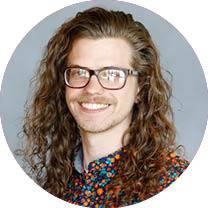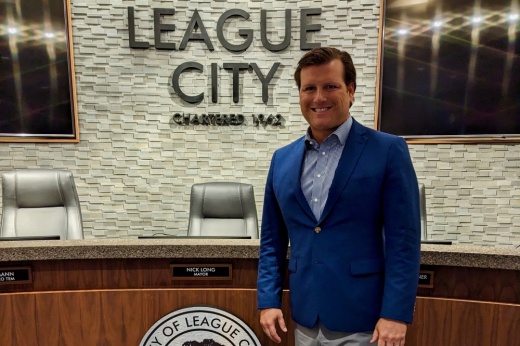What prompted you to run for local office?
[I] grew up here, and, obviously, when we grew up here, it was very different. It was a much smaller town; there was one high school in town—just [Clear] Creek for the entire city. And then just seeing the growth happen, it’s changed a lot, and then just realizing that it had already gone from 30,000 people when I grew up here to 100,000, and it was on the path to 250,000, right? And so [I] wanted to have the opportunity to impact how we were developing that second major phase of growth of our city and to be involved with that.
Before I got on City Council, I was on the finance committee for several years as well, so I had some experience with the budget and how it worked and what they were looking for, so [I] thought there were some opportunities to contribute to that. And really, the part that I thought I could contribute to the most was the financial management of the city and how we use debt as a tool, and how we kept what we were doing with the tax rate and be the fiscal monitor and make sure we could live within our means.
And then the other part I was concerned about was, as the city grew, were we going to lose that kind of small-town charm, or are we going to lose the connection that people have to the city of League City? Because if you look at where the growth is, it’s all happening in the part of the town where the kids will go to Dickinson schools; they’ll have a Dickinson mailing address; they’ll play Dickinson Little League, but they buy their water from the city of League City, so they won’t necessarily have a connection to League City unless we take steps to create that connection.
Why did you decide to run for mayor?
I was out of terms as City Council [member]—two-term limit—and then there was just an opportunity there with Mayor [Pat] Hallisey not running, and really, here’s the time where the rubber meets the road. The first eight years we were kind of planning the whole time for the Grand Parkway, and the Grand Parkway really is the key to opening up the massive growth, because right now, to get to those pastures that are sitting out there that are going to be homes in the next decade, it’s not really feasible without the Grand Parkway, and so as that kind of gets to fruition or we might actually see it completed, now is the time to really make those plans and really influence how the Grand Parkway is really going to be built out and then how we develop out that last piece.
What do you hope to accomplish as mayor?
My goal is I’d like to drive down the Grand Parkway before I am no longer the mayor. That’d be the best-case scenario, and I think we’re actually seeing it. [The Texas Department of Transportation] is moving. ... Big meetings with the land owners out there, and they’re moving along. They’re doing environmental surveys. They’re trying to start those environmental surveys in May, so we’re actually seeing them do things, which is a lot different than the past decade.
Is there anything you want to change about how the mayor’s office works or how the city does business?
No. I like the way the mayor’s office works. I don’t want a strong mayor. ... You’re essentially the chairman of the board more than you’re anything else, if you’re going to take a kind of corporate analogy to that. The mayor’s the chairman; the council’s the board members, and then the city manager’s the CEO. I think it’s a pretty effective way. I don’t want to make executive decisions and act as the manager. I think we need a professional that knows that stuff. I think the council is better at setting more strategic direction than it would be managing the day-to-day operations of the city.
What has been your proudest achievement so far as a council member or mayor?
Maybe not the proudest achievement of mine but certainly interesting is, and I think it’s worked out well, is the bypass at the five corners. And the reason I think it’s kind of interesting is when I was in high school, and obviously I went to Creek, we actually did a project in civics class about something you could change and how you would change it within the city, and I wrote my paper about five corners, and then it only took another like 15, 20 years to get something done. I never thought I’d actually be the one to do something about it later, but ... I actually kind of got to see it to fruition. And what I liked about that project is I think we spent about $4 million, which, in a government project, sadly, $4 million usually doesn’t go very far, but ... that little bypass made a significant difference, and it’s worked better than I think most people thought, and it’s really helped kind of move people around at a relatively good bargain.
A similar project that I was really love for a variety of reasons is the dog park on the west side of town. That used to be a water plant out there, so we decommissioned the water plant, and we got the new plant. It was just kind of a weird piece of property that wasn’t really being used by the city, but we kind of leveraged community involvement; I helped raise some money with different partners with a variety of different groups; and we built that dog park for $125,000, and it is constantly used. It’s one of the highest-used parks that we have and kind of through a community partnership with a little bit of city money we took kind of an awkward, not-used piece of property and turned it into something pretty remarkable for the citizens that’s used all the time, and so that’s pretty neat to see all the combinations work together to get some real value out of it.
And then the last thing that I think is quite exceptional is we’ve decreased the tax rate below the effective rate—so true tax decreases in terms of dollars to homeowners—every year for the past eight years, and so a lot of places can’t say that. They especially can’t say that and be getting more infrastructure projects done than ever before, and that’s really a testament to ... making a commitment to fiscal discipline at the top and then allowing the management to work in a way to find ways to save money, so not micromanaging how they do it [but] just saying, 'This is what we’re going to do,' and then allowing them to use their expertise and creativity to figure out how to work within the means and still get a lot of projects done.
What is one challenge about being mayor that residents are not aware of?
Every time you go to the grocery store, you get to hear about every pothole that’s out there, but that kind of stuff is actually a little bit fun that you get to interact with people and hear what’s happening and try to solve their problems. It takes a significant amount of time to do it right. There's always another meeting to go to or another charity event or what have you, so just [balancing] the amount of time it takes to be mayor with the amount of time to have a job and be a dad at the same time. So just balancing all three of those competing priorities.
Do you have any other political goals, like a higher office?
Not at this time, and mainly just because when you talk about balancing it with being a dad, I still want to be able to coach Little League and go to all the different things they have going on. Also I like my job and want to keep my full-time actual paying job, and don’t really have any aspirations for a paying political job. I’d always want it to be a volunteer or lowly paid political job.
What is your favorite thing about League City?
I love the water, so especially in the summer, going on the lake is by far my favorite thing. It’s pretty neat also that my kids will go to the same schools that I went to—like, the exact same schools that I went to, have some of the same teachers I had, which is pretty neat. And then I get to watch them play Little League, and they’ll play against [the kids of guys] I grew up with. So it’s all pretty fun to do that stuff, and it’s been neat living near my parents and my in-laws and stuff so that my family’s been super involved with my kids as well, and they’re at every game. It’s a neat place to grow u; just the fact that you’re still very close to Houston, that airports, all that, but then you get a little bit more of that recreational side built in and high quality of life.





